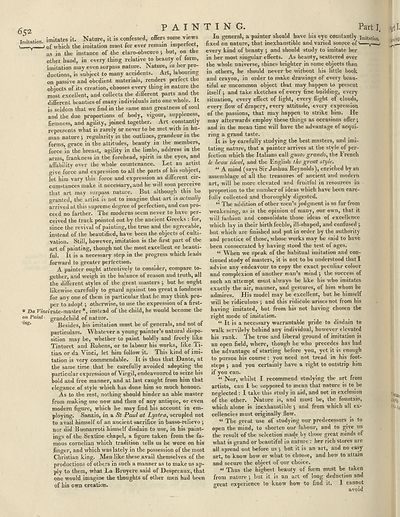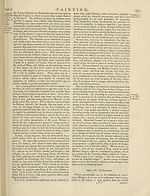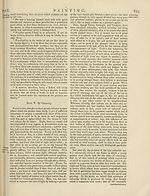Encyclopaedia Britannica > Volume 15, NIC-PAR
(728) Page 652
Download files
Complete book:
Individual page:
Thumbnail gallery: Grid view | List view

652
Imitation, imitates it. Nature, it is confessed, offers some views
of which the imitation must for ever remain impertect,
as in the instance of the claro-obscuro j hut, on the
other hand, in every thing relative to beauty ot form,
imitation may even surpass nature. Nature, in her pi o-
ductions, is subject to many accidents. Art, labouring
on passive and obedient materials, renders perfect the
objects of its creation, chooses every thing in nature the
most excellent, and collects the different parts and the
different beauties of many individuals into one whole. It
is seldom that we find in the same man greatness of soul
and the due proportions of body, vigour, suppleness,
firmness, and agility, joined together. Art constantly
represents what is rarely or never to be met with in hu¬
man nature ; regularity in the outlines, grandeur in the
forms, grace in the attitudes, beauty in the members,
force in the breast, agility in the limbs, address in the
arms, frankness in the forehead, spirit in the eyes, and
affability over the whole countenance. Let an artist
give force and expression to all the parts ol his subject,
let him vary this force and expression as different cir¬
cumstances make it necessary, and he will soon perceive
that art may surpass nature. But although this be
granted, the artist is not to imagine that art is actually
arrived at this supreme degree of perfection, and can pro¬
ceed no farther. The moderns seem never to have per¬
ceived the track pointed out by the ancient Greeks : for,
since the revival of painting, the true and the agreeable,
instead of the beautified, have been the objects ot culti¬
vation. Still, however, imitation is the first part of the
art of painting, though not the most excellent or beauti¬
ful. It is a necessary step in the progress which leads
forward to greater perfection.
A painter ought attentively to consider, compare to¬
gether, and weigh in the balance of reason and truth, all
the different styles of the great masters j but he ought
likewise carefully to guard against too great a fondness
for any one of them in particular that he may think pro¬
per to adopt ; otherwise, to use the expression of a first-
* Do Vinci rate-master *, instead of the child, he would become the
on Paint- grandchild of nature.
'ms‘ Besides, his imitation must be of generals, and not of
particulars. Whatever a young painter’s natural dispo¬
sition may be, whether to paint boldly and freely like
Tintoret and Rubens, or to labour his works, like Ti¬
tian or da Vinci, let him follow it. This kind of imi¬
tation is very commendable. It is thus that Dante, at
the same time that he carefully avoided adopting the
particular expressions of Virgil, endeavoured to seize his
bold and free manner, and at last caught from him that
elegance of style which has done him so much honour.
As to the rest, nothing should hinder an able master
from making use now and then of any antique, or even
modem figure, which he may find his account in em¬
ploying. Sanzio, in a St Paul at Lystra, scrupled not
to avail himself of an ancient sacrifice in basso-relievo ;
nor did Buonarroti himself disdain to use, in his paint¬
ings of the Sextine chapel, a figure taken from the fa¬
mous cornelian which tradition tells us he wore on his
finger, and which was lately in the possession of the most
Christian king. Men like these avail themselves of the
productions of others in such a manner as to make us ap¬
ply to them, what La Bruyere said of Despreaux, that
one would imagine the thoughts of other men had been
of his own creatic®.
PAINTING. Part I,
In genera;!, a painter should have his eye constantly imitatjoa
fixed on nature, that inexhaustible and varied source of-v-—i
every kind of beauty } and should study to imitate her
in her most singular effects. As beauty, scattered over
the whole universe, shines brighter in some objects than
in others, he should never be without his little book
and crayon, in order to make drawings of every beau¬
tiful or uncommon object that may happen to present
itself j and take sketches of every fine building, every
situation, every effect of light, every flight of clouds,
every flow of drapery, every attitude, every expression
of the passions, that may happen to strike him. He
may afterwards employ these things as occasions offer;
and in the mean time will have the advantage of acqui¬
ring a grand taste.
It is by carefully studying the best masters, and imi¬
tating nature, that a painter arrives at the style of per¬
fection which the Italians call gusto grande, the French
le beau ideal, and the English the great style.
“ A mind (says Sir Joshua Reynolds), enriched by an
assemblage of all the treasures of ancient and modern
art, will be more elevated and fruitful in resources in
proportion to the number of ideas which have been care¬
fully collected and thoroughly digested.
“ The aeldition of other men’s judgment is so far from
weakening, as is the opinion of many, our own, that it
will fashion and consolidate those ideas of excellence
which lay in their birth feeble, ill-shaped, and confused 5
but which are finished and put in order by the authority
and practice of those, whose works may be said to have
been consecrated by having stood the test of ages.
“ When we speak of the habitual imitation and con¬
tinued study of masters, it is not to be understood that I
advise any endeavour to copy the exact peculiar colour
and complexion of another man’s mind 5 the success of
such an attempt must always be like his who imitates
exactly the air, manner, and gestures, of him whom he
admires. His model may be excellent, but he himself
will be ridiculous ; and this ridicule arises not from his
having imitated, but from his not having chosen the
right mode of imitation.
“ It is a necessary warrantable pride to disdain to
walk servilely behind any individual, however elevated
his rank. The true and liberal ground of imitation is
an open field, where, though he who precedes has had
the advantage of starting before you, yet it is enough
to pursue his course : you need not tread in his foot¬
steps j and you certainly have a right to outstrip him
if you can.
“ Nor, whilst I recommend studying the art from
artists, can I be supposed to mean that nature is to be
neglected : I take this study in aid, and not in exclusion
of the other. Nature is, and must be, the fountain,
which alone is inexhaustible j and from which all ex¬
cellencies must originally flow.
u The great use of studying our predecessors is to
open the mind, to shorten our labour, and to give us
the result of the selection made by those great minds ot
what is gr and or beautiful in nature : her rich stores are
all spread out before us ; but it is an art, and no easy
art, to know how or what to choose, and how to attain
and secure the object of our choice.
“ Thus the highest beauty of form must be taken
from nature 5 but it is an art of long deduction and
great experience to know how to find it. I cannot
Imitation, imitates it. Nature, it is confessed, offers some views
of which the imitation must for ever remain impertect,
as in the instance of the claro-obscuro j hut, on the
other hand, in every thing relative to beauty ot form,
imitation may even surpass nature. Nature, in her pi o-
ductions, is subject to many accidents. Art, labouring
on passive and obedient materials, renders perfect the
objects of its creation, chooses every thing in nature the
most excellent, and collects the different parts and the
different beauties of many individuals into one whole. It
is seldom that we find in the same man greatness of soul
and the due proportions of body, vigour, suppleness,
firmness, and agility, joined together. Art constantly
represents what is rarely or never to be met with in hu¬
man nature ; regularity in the outlines, grandeur in the
forms, grace in the attitudes, beauty in the members,
force in the breast, agility in the limbs, address in the
arms, frankness in the forehead, spirit in the eyes, and
affability over the whole countenance. Let an artist
give force and expression to all the parts ol his subject,
let him vary this force and expression as different cir¬
cumstances make it necessary, and he will soon perceive
that art may surpass nature. But although this be
granted, the artist is not to imagine that art is actually
arrived at this supreme degree of perfection, and can pro¬
ceed no farther. The moderns seem never to have per¬
ceived the track pointed out by the ancient Greeks : for,
since the revival of painting, the true and the agreeable,
instead of the beautified, have been the objects ot culti¬
vation. Still, however, imitation is the first part of the
art of painting, though not the most excellent or beauti¬
ful. It is a necessary step in the progress which leads
forward to greater perfection.
A painter ought attentively to consider, compare to¬
gether, and weigh in the balance of reason and truth, all
the different styles of the great masters j but he ought
likewise carefully to guard against too great a fondness
for any one of them in particular that he may think pro¬
per to adopt ; otherwise, to use the expression of a first-
* Do Vinci rate-master *, instead of the child, he would become the
on Paint- grandchild of nature.
'ms‘ Besides, his imitation must be of generals, and not of
particulars. Whatever a young painter’s natural dispo¬
sition may be, whether to paint boldly and freely like
Tintoret and Rubens, or to labour his works, like Ti¬
tian or da Vinci, let him follow it. This kind of imi¬
tation is very commendable. It is thus that Dante, at
the same time that he carefully avoided adopting the
particular expressions of Virgil, endeavoured to seize his
bold and free manner, and at last caught from him that
elegance of style which has done him so much honour.
As to the rest, nothing should hinder an able master
from making use now and then of any antique, or even
modem figure, which he may find his account in em¬
ploying. Sanzio, in a St Paul at Lystra, scrupled not
to avail himself of an ancient sacrifice in basso-relievo ;
nor did Buonarroti himself disdain to use, in his paint¬
ings of the Sextine chapel, a figure taken from the fa¬
mous cornelian which tradition tells us he wore on his
finger, and which was lately in the possession of the most
Christian king. Men like these avail themselves of the
productions of others in such a manner as to make us ap¬
ply to them, what La Bruyere said of Despreaux, that
one would imagine the thoughts of other men had been
of his own creatic®.
PAINTING. Part I,
In genera;!, a painter should have his eye constantly imitatjoa
fixed on nature, that inexhaustible and varied source of-v-—i
every kind of beauty } and should study to imitate her
in her most singular effects. As beauty, scattered over
the whole universe, shines brighter in some objects than
in others, he should never be without his little book
and crayon, in order to make drawings of every beau¬
tiful or uncommon object that may happen to present
itself j and take sketches of every fine building, every
situation, every effect of light, every flight of clouds,
every flow of drapery, every attitude, every expression
of the passions, that may happen to strike him. He
may afterwards employ these things as occasions offer;
and in the mean time will have the advantage of acqui¬
ring a grand taste.
It is by carefully studying the best masters, and imi¬
tating nature, that a painter arrives at the style of per¬
fection which the Italians call gusto grande, the French
le beau ideal, and the English the great style.
“ A mind (says Sir Joshua Reynolds), enriched by an
assemblage of all the treasures of ancient and modern
art, will be more elevated and fruitful in resources in
proportion to the number of ideas which have been care¬
fully collected and thoroughly digested.
“ The aeldition of other men’s judgment is so far from
weakening, as is the opinion of many, our own, that it
will fashion and consolidate those ideas of excellence
which lay in their birth feeble, ill-shaped, and confused 5
but which are finished and put in order by the authority
and practice of those, whose works may be said to have
been consecrated by having stood the test of ages.
“ When we speak of the habitual imitation and con¬
tinued study of masters, it is not to be understood that I
advise any endeavour to copy the exact peculiar colour
and complexion of another man’s mind 5 the success of
such an attempt must always be like his who imitates
exactly the air, manner, and gestures, of him whom he
admires. His model may be excellent, but he himself
will be ridiculous ; and this ridicule arises not from his
having imitated, but from his not having chosen the
right mode of imitation.
“ It is a necessary warrantable pride to disdain to
walk servilely behind any individual, however elevated
his rank. The true and liberal ground of imitation is
an open field, where, though he who precedes has had
the advantage of starting before you, yet it is enough
to pursue his course : you need not tread in his foot¬
steps j and you certainly have a right to outstrip him
if you can.
“ Nor, whilst I recommend studying the art from
artists, can I be supposed to mean that nature is to be
neglected : I take this study in aid, and not in exclusion
of the other. Nature is, and must be, the fountain,
which alone is inexhaustible j and from which all ex¬
cellencies must originally flow.
u The great use of studying our predecessors is to
open the mind, to shorten our labour, and to give us
the result of the selection made by those great minds ot
what is gr and or beautiful in nature : her rich stores are
all spread out before us ; but it is an art, and no easy
art, to know how or what to choose, and how to attain
and secure the object of our choice.
“ Thus the highest beauty of form must be taken
from nature 5 but it is an art of long deduction and
great experience to know how to find it. I cannot
Set display mode to:
![]() Universal Viewer |
Universal Viewer | ![]() Mirador |
Large image | Transcription
Mirador |
Large image | Transcription
Images and transcriptions on this page, including medium image downloads, may be used under the Creative Commons Attribution 4.0 International Licence unless otherwise stated. ![]()
| Encyclopaedia Britannica > Encyclopaedia Britannica > Volume 15, NIC-PAR > (728) Page 652 |
|---|
| Permanent URL | https://digital.nls.uk/192591162 |
|---|
| Attribution and copyright: |
|
|---|
| Shelfmark | EB.11 |
|---|---|
| Description | Ten editions of 'Encyclopaedia Britannica', issued from 1768-1903, in 231 volumes. Originally issued in 100 weekly parts (3 volumes) between 1768 and 1771 by publishers: Colin Macfarquhar and Andrew Bell (Edinburgh); editor: William Smellie: engraver: Andrew Bell. Expanded editions in the 19th century featured more volumes and contributions from leading experts in their fields. Managed and published in Edinburgh up to the 9th edition (25 volumes, from 1875-1889); the 10th edition (1902-1903) re-issued the 9th edition, with 11 supplementary volumes. |
|---|---|
| Additional NLS resources: |
|

